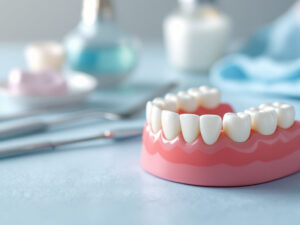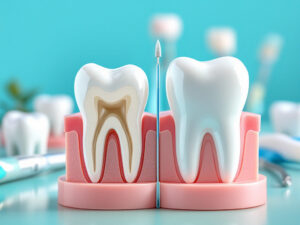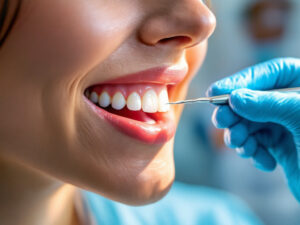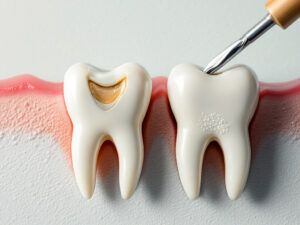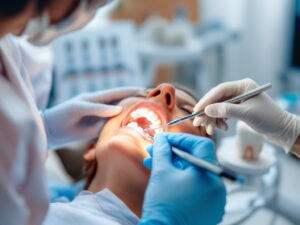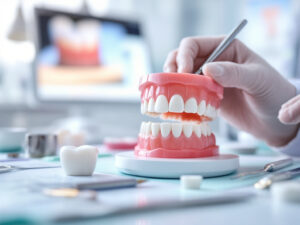Discover dental crown placement
Dental crown placement is a highly effective procedure designed to restore and protect damaged or weakened teeth. If you or a loved one needs a long-term solution that enhances both function and appearance, crowns can serve as a valuable option. A dental crown is essentially a tooth-shaped cap that fully covers the visible portion of a tooth above the gum line, offering protection from further damage while improving overall aesthetics.
Many people find themselves worrying about pain or discomfort throughout restorative procedures. At Cloninger Dentistry, we understand these concerns and are committed to creating a supportive, empathetic environment that puts your wellbeing first. Our team focuses on helping you feel at ease as we restore the health and functionality of your smile.
Crowns are frequently recommended in scenarios where a tooth has extensive decay, a large filling, or has undergone root canal therapy. By covering the entire visible surface of the tooth, a crown stabilizes the structure, helps maintain proper bite alignment, and gives you added confidence when you chew or speak. According to WebMD (WebMD), crowns typically last anywhere from five to 15 years. With the right care—including brushing, flossing, and routine dental visits—you may achieve the upper end of that range, preserving your natural tooth.
In addition to reinforcing weakened teeth, crowns can also boost your smile’s appearance. If you have a misshapen or discolored tooth, your dentist may recommend placing a custom crown that replicates the look and feel of your natural teeth. Furthermore, many individuals choose crowns alongside other cosmetic treatments, such as teeth whitening or veneers, to truly enhance their overall smile. Regardless of your specific reason for receiving a crown, the primary goal remains the same: to provide you with a durable, comfortable, and aesthetically pleasing solution for long-term oral health.
Realize the benefits of crowns
Dental crowns serve as a cornerstone for maintaining strong teeth and a healthy mouth. Whether you are managing serious tooth decay, seeking to restore tooth structure after breakage, or addressing tooth sensitivity, there are several advantages to relying on a custom-fitted crown:
- Protection against further damage: When a tooth has been weakened by decay or fractures, covering it with a crown helps to fortify the remaining structure and reduce the likelihood of additional harm. This is particularly valuable for teeth that have undergone procedures such as root canal therapy.
- Restored functionality: Once in place, a crown allows you to chew and speak as though you had a completely healthy tooth. Instead of worrying about pain or sensitivity when you bite down, you can enjoy your favorite meals without fear of breaking a vulnerable tooth.
- Improved appearance: Depending on the type and material of the crown, you may achieve an impressive degree of aesthetic alignment with your existing teeth. Modern crowns blend seamlessly with neighboring teeth, so your smile looks naturally uniform.
- Versatility: Crowns work in a variety of scenarios, including covering dental implants, creating anchorage for dental bridge placement, and replacing large fillings. Its versatility demonstrates the vital role a crown plays in contemporary dentistry.
An important element of crowns, as per the Cleveland Clinic (Cleveland Clinic), is the combination of protection and cosmetic improvement. By covering a tooth completely, a crown protects it from external pressures and prevents fracture. It also conceals any discoloration or abnormalities. These benefits make crowns an invaluable tool for those seeking both durable function and an appealing smile.
Everyone’s experience with crowns looks slightly different, depending on how much tooth structure remains and any related oral health concerns. However, many patients report feeling a renewed sense of confidence in their smile and overall comfort, especially when a reliable team like Cloninger Dentistry ensures quality materials, precise-fitting techniques, and individualized follow-up care. This sort of personalized attention can make the difference between short-term relief and a solution that stands the test of time.
Consider common crown materials
When exploring your options for a crown, you will notice that different materials cater to different preferences and needs. Each type offers its own strength, longevity, and aesthetic appeal. Understanding their unique qualities can help you decide on the ideal choice:
- Metal crowns
- Gold, palladium, nickel, and chromium are often used in metal-based crowns.
- They require removing less tooth structure, and typically last the longest in terms of wear-resistance.
- They are often best for out-of-sight molars, where function and durability may matter more than color matching.
- Porcelain-fused-to-metal (PFM)
- These crowns combine durability with a more natural appearance.
- A metal base provides strength, while porcelain on top matches the surrounding teeth.
- They are suitable for both front and back teeth, though the metal substructure can sometimes show a thin dark line at the gums.
- All-ceramic or porcelain
- Highly popular for front teeth, as they mirror the translucency of tooth enamel.
- A suitable choice if you have metal allergies or simply prefer a metal-free option.
- Properly cared for, they can last for many years while offering an excellent cosmetic match.
- Pressed ceramic
- Featuring a hard inner core with a layer of ceramic or porcelain on top.
- Designed to closely replicate the natural look of tooth enamel.
- Typically less prone to chipping than all-porcelain due to the reinforced core.
- All-resin
- Generally lower in cost compared to other crown types.
- Not as strong as porcelain-fused-to-metal or ceramic options.
- Often reserved for temporary or transitional crowns that will eventually be replaced with a more durable material.
Some patients prioritize long-lasting durability over aesthetics, while others zero in on cosmetic appeal. For example, if the crown is needed for a front tooth, you might prefer an all-ceramic or porcelain-fused-to-metal crown for a more seamless look. If you need a crown on a back molar that faces significant biting pressure, a full-metal or pressed ceramic option may better suit that scenario. When you work with a trusted provider like Cloninger Dentistry, you gain access to expert recommendations designed around your oral health, stylistic preferences, and budget.
Understand the procedure steps
While the specifics can vary, the process of placing a dental crown typically occurs in two major appointments. Thanks to modern advancements and patient-focused approaches, you can enjoy a more streamlined, comfortable experience from start to finish.
- Examination and preparation
During your first visit, the dental care team performs a thorough exam. This might involve digital xray imaging or 3d imaging dental diagnostics and a conversation about your dental goals. Your tooth is carefully reshaped to ensure a precise fit and strong anchor for the crown. Next, an impression is taken to capture the dimensions and contours of your prepared tooth. You typically receive a temporary crown to protect the tooth while a dental lab fabricates the permanent version. - Design and fabrication
Depending on the technology your dental office uses, crown design and fabrication may happen on-site or in an external lab. Some practices employ advanced computer-aided design and manufacturing (CAD/CAM) systems, which can produce a crown in a single visit. However, in many cases, the lab process takes one to two weeks, after which you return for your final placement. - Final placement
Once your permanent crown is ready, you will have a second appointment. The dentist removes your temporary crown, checks the fit of the permanent crown, and makes minor adjustments if needed. A bonding cement secures the new crown into place. After a few minutes, the crown is firmly attached, though you should follow any guidelines given regarding food intake and oral care in the first few days.
According to the Cleveland Clinic (Cleveland Clinic), it’s common for people to experience brief sensitivity following crown placement. By the day’s end, you can usually resume normal activities, returning to work or school with minimal disruption. The process might look slightly different if you require additional treatments, such as painless cavity filling or gum disease treatment, before the crown can be placed. Nonetheless, each phase is designed to protect your tooth’s health and replicate its natural look.
Follow proper aftercare practices
Once you receive a crown, the aftercare phase is pivotal to long-term success. A newly placed crown needs attention to ensure it bonds securely and you adapt comfortably:
- Avoid chewing immediately: It is best to wait until numbness wears off before eating. This prevents accidental biting of the cheeks or tongue.
- Stick to softer foods the first day: Minimizing pressure on your crown right after placement helps it remain stable. Chew gently on the opposite side of your mouth for added protection.
- Practice impeccable oral hygiene: While a crown cannot decay in the same way as natural enamel, gum tissue and underlying tooth structures can still be affected by bacteria. Focus on brushing twice a day using gentle, circular motions around the gum line. Floss carefully near the crown to avoid dislodging cement, and consider antimicrobial mouthwash for added defense.
- Be mindful of grinding: If you are prone to bruxism, or teeth grinding, especially at night, your dentist may recommend a night guard to protect your new crown from cracks or early wear.
- Watch for signs of irritation: It is normal to feel some sensitivity to heat or cold for a short while. If this lingers or worsens, or if you experience pain while biting, contact your dentist.
In certain cases, crowns can become loose or fall out entirely, particularly when temporary cement is used. If this happens, checking in with your provider is vital. You may need lost crown repair or a more extensive procedure if damage continues. Prompt action can prevent minor issues from escalating into bigger complications like infection or decay beneath the crown.
Finally, factoring in regular routine dental checkup appointments is one of the best ways to protect your investment. Routine professional assessments help ensure a crown’s perfect fit, catch any sign of gum recession, and confirm ongoing comfort. By following these steps, you keep your new crown functioning properly and maintain a healthier, brighter smile.
Address potential complications early
Although dental crowns are generally safe and effective, there can be a few pitfalls worth acknowledging. Paying attention to potential problems helps you catch them fast:
- Decay under the crown: If bacteria slip under the margins of the crown, it may lead to decay in the underlying natural tooth. Poor oral hygiene or loose-fitting crowns often contribute to this risk.
- Sensitivity or pain: A crown that does not fully cover the underlying tooth or is slightly misaligned might leave the dentin exposed, triggering temperature sensitivity. Sometimes, mild discomfort occurs shortly after it is placed, but consistent or worsening pain should prompt a trip to your dentist.
- Allergic reactions: In rare cases, some patients are allergic to metal components or certain material blends. If you suspect an allergy based on swelling, irritation, or inflammation near the gum line, consult your dentist for an alternative material.
- Crown loosening: Despite robust cement, crowns can become dislodged if you chew on hard objects or if the underlying cement weakens over time. If a crown starts feeling loose, early intervention is key to preventing further complications.
Should any of these issues arise, communicating with your dental practice expediently is crucial. Immediate evaluation can help determine if a slight adjustment will resolve the problem or if more extensive work, such as broken tooth repair or a new crown, is needed. Dentists rely on ongoing patient feedback, along with regular checkups, to ensure that crowns precisely fit in with the rest of your mouth’s natural bite.
Furthermore, if you notice bleeding gums or inflamed tissues near your crown, you might need specialized support from your dentist to rule out gum disease. Tools like gum disease treatment maintain tissue health, so your crown remains stable. Taking action sooner and partnering with an empathetic practice like Cloninger Dentistry puts you back on track and provides the reassurance you need during any dental mishaps or uncertainties.
Compare costs and insurance
The cost of a dental crown can vary widely based on your location, the dentist’s expertise, the crown material, and additional procedures you might need. In many regions, the price may range from $500 to $2,000 or more, reflecting a combination of laboratory fees, materials, and dentist fees. According to WebMD (WebMD), a crown alone could run from $800 to $1,700, while other sources, such as Ocean Breeze Prosthodontics (Ocean Breeze Prosthodontics), note coverage can start around $500 and go well into the $2,000 range.
While some insurance plans might offer partial coverage for restorative procedures like crowns, the degree of coverage hinges on your specific policy. Cosmetic considerations—like replacing a tooth primarily for appearance rather than function—may not always be covered. However, if a dentist deems a crown medically necessary, such as for preventing tooth loss or addressing significant decay, you may receive more coverage. It is wise to talk directly with your insurance company or consult an insurance friendly dental practice to clarify your plan’s details.
If you are worried about paying for your crown, you can look into flexible payment options that many dental offices offer. At Cloninger Dentistry, for instance, we strive to provide transparent dental pricing, along with solutions such as flexible financing dental. Splitting the cost into manageable payments can reduce financial stress, so you can focus on regaining a healthy smile without feeling financially overwhelmed.
Explore Cloninger Dentistry services
When it comes to comprehensive family and cosmetic dentistry, Cloninger Dentistry sets itself apart through attentive, personalized care. From the moment you step into our office, every aspect of your treatment—starting with diagnosis right through to crown placement—reflects our commitment to your comfort and long-term health. We understand the importance of thorough oral care for the entire family, whether it involves pediatric dental care for your child or advanced restorative options for an adult.
If you need to replace or support weakened or cracked teeth, our porcelain crown service can often provide a minimally invasive and aesthetically pleasing answer. By integrating a fully customized treatment plan, we can combine crown placement with complementary services like professional teeth cleaning and fluoride treatment for a more holistic approach. This synergy ensures that all facets of your oral wellbeing are looked after, from preventive measures to cosmetic enhancements.
Our semi-formal yet warm and empathetic tone extends to every stage of your visit. We assure you of complete transparency with estimates and a written treatment estimate that clarifies the cost of any procedure. This level of detail and courtesy is one reason why many families choose Cloninger Dentistry for their ongoing dental needs. If you have a busy schedule or a sudden issue, we even offer a same day dental appointment when available, so you can receive urgent care for crowns, fillings, or other procedures right away.
Ultimately, Cloninger Dentistry’s mission goes beyond addressing immediate dental concerns. We aim to cultivate a foundation of trust so that you or your loved one can return confidently for routine dental checkup, potential dental infection treatment, or even a cosmetic upgrade. Whether you are seeking typical family dental care or specialized restorative solutions, our team provides the support and expertise needed for lasting oral health.
FAQs about dental crowns
1. How long do dental crowns typically last?
Dental crowns can last between five and 15 years, depending on factors such as your oral hygiene routine, dietary habits, and the material used. Regular brushing, flossing, and professional checkups help extend the lifespan of your crown. If you grind your teeth, consider a night guard to protect both your natural teeth and the crown.
2. Is the crown placement procedure painful?
Most patients report only mild discomfort or no pain at all, especially with modern local anesthetics that numb the area effectively. After the procedure, you may experience temporary sensitivity, but it usually subsides within a few days. If you experience prolonged pain, consult your dentist for an evaluation.
3. How should I care for my dental crown at home?
Maintaining a strong crown is similar to caring for your natural teeth. Brush at least twice daily with a soft-bristled toothbrush, floss gently around the crown, and use antimicrobial mouthwash to minimize plaque buildup. Avoid biting down on hard objects like ice or candy to reduce the risk of cracks or chips.
4. What if my crown falls out or becomes loose?
If your crown dislodges, contact your dentist promptly for lost crown repair. In the meantime, avoid chewing on that side of your mouth and keep the tooth as clean as possible. Your dentist may be able to recement the crown if no other structural damage has occurred, or recommend a replacement if necessary.
5. Am I a good candidate for a dental crown?
You might be an ideal candidate for a crown if you have a weakened tooth due to decay, a cracked tooth, or a tooth needing structural support after a root canal. If you are looking to improve the appearance of a misshapen or severely discolored tooth, a crown can also be an excellent option. Schedule a comprehensive evaluation with Cloninger Dentistry to discuss your needs.
By following these guidelines and working with a compassionate, highly experienced dental team, you can expect your crown to fit securely, look natural, and serve you for many years. Cloninger Dentistry stands ready to deliver a personalized experience that helps you manage any concerns while ensuring a comfortable, effective placement procedure. With empathy, expertise, and a commitment to high-quality patient care, we strive to make your journey toward a healthier, brighter smile as smooth and rewarding as possible.


